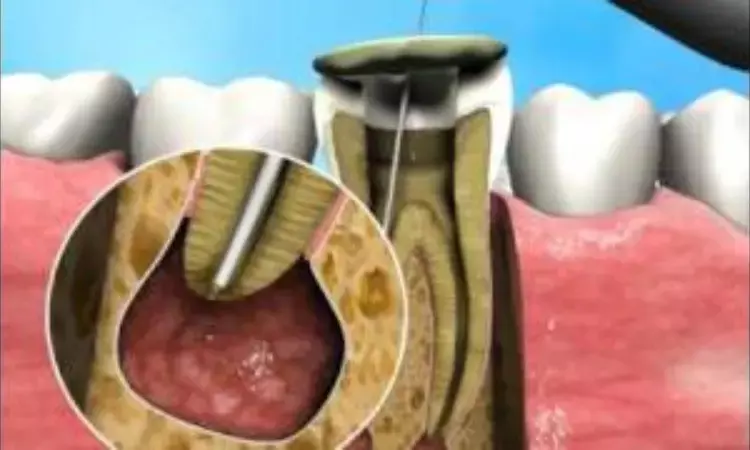- Home
- Medical news & Guidelines
- Anesthesiology
- Cardiology and CTVS
- Critical Care
- Dentistry
- Dermatology
- Diabetes and Endocrinology
- ENT
- Gastroenterology
- Medicine
- Nephrology
- Neurology
- Obstretics-Gynaecology
- Oncology
- Ophthalmology
- Orthopaedics
- Pediatrics-Neonatology
- Psychiatry
- Pulmonology
- Radiology
- Surgery
- Urology
- Laboratory Medicine
- Diet
- Nursing
- Paramedical
- Physiotherapy
- Health news
- Fact Check
- Bone Health Fact Check
- Brain Health Fact Check
- Cancer Related Fact Check
- Child Care Fact Check
- Dental and oral health fact check
- Diabetes and metabolic health fact check
- Diet and Nutrition Fact Check
- Eye and ENT Care Fact Check
- Fitness fact check
- Gut health fact check
- Heart health fact check
- Kidney health fact check
- Medical education fact check
- Men's health fact check
- Respiratory fact check
- Skin and hair care fact check
- Vaccine and Immunization fact check
- Women's health fact check
- AYUSH
- State News
- Andaman and Nicobar Islands
- Andhra Pradesh
- Arunachal Pradesh
- Assam
- Bihar
- Chandigarh
- Chattisgarh
- Dadra and Nagar Haveli
- Daman and Diu
- Delhi
- Goa
- Gujarat
- Haryana
- Himachal Pradesh
- Jammu & Kashmir
- Jharkhand
- Karnataka
- Kerala
- Ladakh
- Lakshadweep
- Madhya Pradesh
- Maharashtra
- Manipur
- Meghalaya
- Mizoram
- Nagaland
- Odisha
- Puducherry
- Punjab
- Rajasthan
- Sikkim
- Tamil Nadu
- Telangana
- Tripura
- Uttar Pradesh
- Uttrakhand
- West Bengal
- Medical Education
- Industry
Study Links Elevated Serum Hepatic Transaminases to Apical Periodontitis

Chile: A recent study has brought to light a concerning association between elevated serum hepatic transaminases and apical periodontitis, a common dental condition affecting the root tip of a tooth. The study aimed to explore potential connections between oral health and liver function markers.
Apical periodontitis (AP) is associated with higher serum hepatic transaminases alanine aminotransferase (ALT) and aspartate aminotransferase (AST), potentially contributing to nonalcoholic fatty liver disease (NAFLD) physiopathology in young adults, the study stated. The findings were published in the International Endodontic Journal.
Apical periodontitis occurs when bacteria infect the dental pulp and spread to the root tip, leading to inflammation and possible infection in the surrounding tissues. The condition is prevalent among adults and can cause significant discomfort if left untreated. Whilst AP has been linked with noncommunicable diseases and systemic inflammation, its potential association with NAFLD is unknown. Considering this, Marcela Hernández, Universidad de Chile, Santiago, Chile, and colleagues aimed to evaluate the serum ALT and AST levels as surrogate markers of hepatic injury, and the systemic inflammatory burden in otherwise healthy individuals with and without AP diagnosis.
For this purpose, the researchers recruited individuals with AP (n = 30) and healthy controls (n = 29) in a cross-sectional study. The mean diameter (mm), number, and periapical index of the apical lesions of endodontic origin (ALEO) were assessed. AST and ALT levels (pg/mL) were measured through enzyme-linked immunosorbent assays.
The serum TNF-α, IL-9, IL-4, IL-10, IL-22, and IL-17A levels were evaluated by Multiplex assay. Inferential analysis was performed using t-test or Mann–Whitney tests as per the data distribution and linear regression models.
The following were the key findings of the study:
- ALT and AST levels were significantly higher in individuals with AP compared to controls.
- Serum inflammatory biomarkers showed no significant differences between the study groups.
- Bivariate and multivariate analyses confirmed that AP diagnosis was independently associated with ALT and AST elevations.
- The number of ALEO positively influenced AST levels.
- IL-22 on the other hand, was associated with reduced ALT levels.
In conclusion, young patients with apical periodontitis exhibited significantly higher serum levels of aspartate aminotransferase and alanine aminotransferase compared to controls, suggesting possible liver injury. Moreover, more severe apical lesions of endodontic origin were associated with higher AST levels.
"Despite comparable serum inflammatory markers between AP patients & controls, AP diagnosis was independently linked to increased AST & ALT levels," the researchers wrote. The study represents a significant step toward elucidating the complex interactions between oral health and systemic conditions like liver function.
Reference:
Bordagaray, M. J., Pellegrini, E., Garrido, M., Hernández-Ríos, P., Villalobos, T., Fernández, A., & Hernández, M. Elevated serum hepatic transaminases in apical periodontitis individuals. International Endodontic Journal. https://doi.org/10.1111/iej.14109
Dr Kamal Kant Kohli-MBBS, DTCD- a chest specialist with more than 30 years of practice and a flair for writing clinical articles, Dr Kamal Kant Kohli joined Medical Dialogues as a Chief Editor of Medical News. Besides writing articles, as an editor, he proofreads and verifies all the medical content published on Medical Dialogues including those coming from journals, studies,medical conferences,guidelines etc. Email: drkohli@medicaldialogues.in. Contact no. 011-43720751


